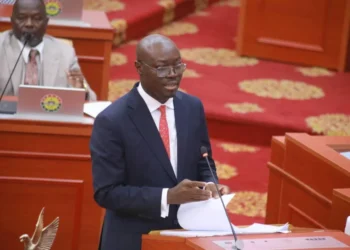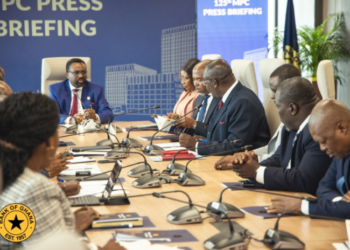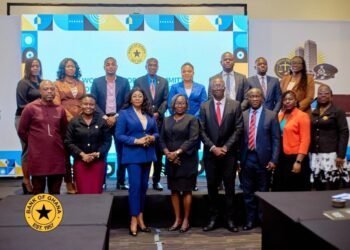Dr. Opoku-Afari has assured businesses of BOG’s reediness to provide the requisite infrastructure needed for development and smooth operation. According to him, the BOG will enhance and fine-tune the policy environment for businesses in a post-COVID-19 environment.
The first Deputy Governor of the Bank of Ghana noted that the Bank is aware of the changing times in the business environment. As such, it continues to monitor the evolution of new trends.
Meanwhile, he cited the establishment of the FinTech and Innovation Office as a demonstration of the Bank’s commitment to enhancing smooth business operations. He added that the BOG staffed the office with well-seasoned personnel, to oversee an orderly development of the growth of this burgeoning sector.
“I will encourage businesses to work conscientiously with banks and FinTechs in the implementation of their digitization strategy”.
Furthermore, he indicated that the BOG will embrace any form of engagement with industry to provide clarity on opportunities available in the banking and payments industry. This, according to him, will help assist businesses overcome the challenges of the pandemic. Likewise, it will help businesses reposition their operations for a post-COVID-19 environment.
BOG to collaborate with Monetary Authority of Singapore
Similarly, he stated that the Bank is aware of the importance of businesses, particularly SMEs, in the Ghanaian economy. He revealed that the BOG is working with the Monetary Authority of Singapore (MAS) on a Business Sans Borders project. This, he said, will enable SMEs in Ghana leverage digital technology to improve on their businesses. Above all, he noted that it will give them access to explore global market opportunities.
Moreover, he noted that due to the COVID-19, businesses are gravitating more towards online customer-business interactions. As a result, he urged all customer centric businesses to restructure their operations to accommodate the increasing customer preference for online buying.
Also, Dr. Opoku-Afari stated that the BOG has permitted some payment service providers to provide merchant acquiring and payment aggregation service for businesses. The rationale is to make it easier for businesses to receive and make online payments. Dr. Opoku-Afari further stated that the BOG has designed and made available solutions to businesses at a low infrastructure cost. He added that it also made connectivity requirements less complex for businesses.
More than 17 million active mobile money accounts
Furthermore, he pointed out that the BOG has issued a three-tier merchant digital account with proportionate onboarding requirements. This will guide financial service providers in meeting the peculiar needs of small and medium scale enterprises. He added that this policy change will facilitate SMEs’ acceptance of digital payments. Consequently, it will provide convenience to their customers and also expand the geographical reach of their business.
Besides, he pointed out that there are more than 17 million active mobile money accounts in the country. He stated that this provides ample evidence of the increasing adoption of digital payments. Above all, it provides a fertile ground for businesses to explore digital channels to interact with customers.
Dr. Opoku-Afari emphasized that the financial sector digitization is part of the Government’s bid to formalize the economy through digital technology. He professed that the country has made tremendous achievements towards building a financial inclusive society through digitization.
Furthermore, he pointed out that the government’s COVID-19 containment measures highlighted the digitization gap. It also brought to the fore the extent to which businesses can explore this gap for economic efficiency and growth. He warned that businesses that are unable to incorporate digitalization in their business models will find it difficult to survive post-COVID.
READ ALSO: Economy expands 3.3% in Q4 2020























